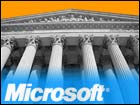Holdout states modify MSFT plan
Opponents of DOJ plan propose even tougher sanctions two days ahead of key court hearing.
March 4, 2002: 5:36 p.m. ET
|
 NEW YORK (CNN/Money) - Two days ahead of a critical court hearing regarding Microsoft's antitrust settlement with the U.S. Department of Justice, the nine states still pushing for tougher sanctions took aim Monday at what they see as a central flaw in the current proposal.
NEW YORK (CNN/Money) - Two days ahead of a critical court hearing regarding Microsoft's antitrust settlement with the U.S. Department of Justice, the nine states still pushing for tougher sanctions took aim Monday at what they see as a central flaw in the current proposal.
The holdout states on Monday filed a modified version of their alternative proposal, arguing that Microsoft should not be allowed to offer any so-called "middleware" that is bound to its Windows operating system software unless it also offers and supports a version of windows that is "unbound."
"Middleware" refers to elements of the operating system, such as Web browsers and digital media players, that work in tandem with but are not critical parts of the operating system.
A federal appeals court ruled that Microsoft acted illegally when it "commingled" software code for Internet Explorer, a middleware product, inside other files needed by the Windows operating system.
However, the Justice Department's proposed settlement did not force Microsoft to separate that code. A senior Justice department official told CNNfn that such a mandate "wasn't necessary" and that the government could reach its objectives without such drastic action.
Under the settlement Microsoft (MSFT: Research, Estimates) is allowed to keep the middleware code in Windows, but must offer PC manufacturers and end users the opportunity to deactivate certain middleware products.
Last November, the Justice Department and Microsoft, deemed a monopolist by the federal court system, reached a settlement pact that would impose a broad range of restrictions on its business practices as a remedy for its anticompetitive practices.
Among the key terms of that agreement are provisions that prohibit Microsoft from entering into licensing agreements with PC manufacturers that restrict them from working with other software developers, a practice referred to as "exclusive dealing." It also would require Microsoft to provide other software makers access to elements of its Windows source code, called application programming interfaces, or APIs, which are necessary for them to make their applications work under the Windows operating system.
However, it does not impose any restrictions on the features Microsoft is allowed to incorporate in its Windows operating system, which was at the heart of the government's case against the company, which has been wending its way through the legal system since 1997.
CNN/Money special report: Microsoft on trial
Nine of the 18 states that had joined the U.S. government in suing Microsoft argue that the Justice Department's proposal does not go far enough and have drafted an alternative proposal that that would set more far-reaching restrictions on its business conduct and impose stricter oversight.
The alternative settlement, among other things, would require Microsoft to offer a stripped-down version of Windows -- one that does not include features such as a Web browsing, digital media and instant messaging -- and force the company to license the operating system to all PC manufacturers at a uniform price.
Microsoft and its allies in the computer industry have said the states' proposed remedies are too extreme and would cause confusion in the industry and hurt consumers.
On Monday, the holdout states said under their modified proposal, Microsoft would have to sell just one "modular" Windows version from which software features such as Internet browsers, media players and instant messengers could be removed, eliminating any confusion.
"The modified measures should deflate Microsoft's overblown rhetoric and apocalyptic predictions about the proposed remedies," said Connecticut's Richard Blumenthal, one of the state attorneys general who has been the most outspoken critic of the Justice Department's plan.
The holdout states' modifications come just four days after Microsoft and the Justice Department modified their proposed settlement of the case, hoping to mollify critics who said the deal contained loopholes that would enable the company to infringe on PC makers' patents.
It also came two days before a critical court hearing is set to begin.
Beginning Wednesday, U.S. District Court Judge Colleen Kollar-Kotelly will preside over a hearing to review the Justice Department's proposed settlement. Such a hearing is required under the Tunney Act, which requires a federal judge's determination of whether an antitrust settlement is in the public interest.
Separate hearings on the alternative proposal submitted by the holdout states begin March 11.
Microsoft was not immediately available for comment. 
-- Reuters contributed to this report.
|
| SPECIAL: |
|
|
|
|
|

|

